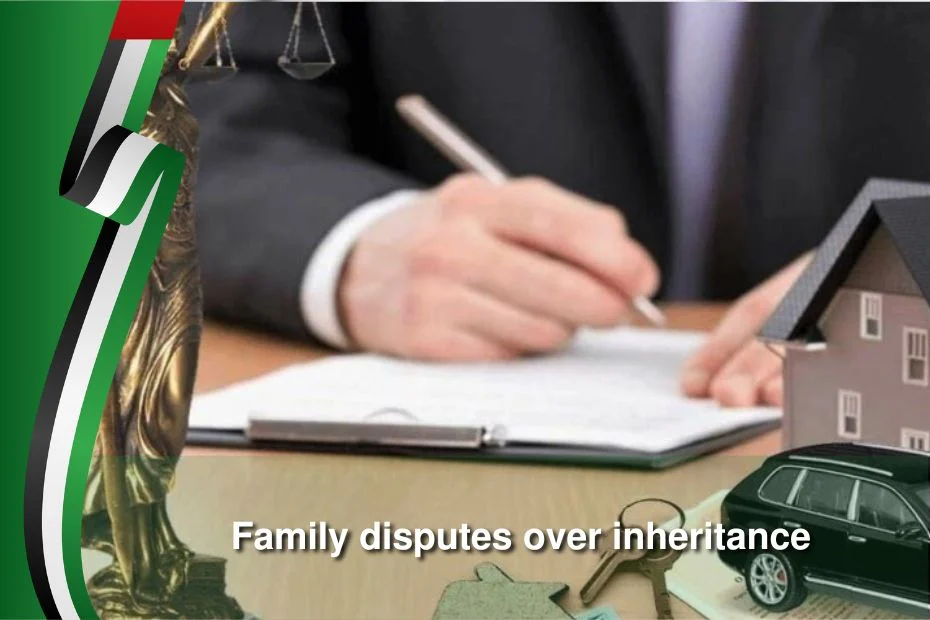Family disputes over inheritance in UAE are sensitive subjects that often lead to conflicts. These disputes are particularly complex when different cultural and legal principles collide.
This article provides information about inheritance disputes in the UAE, emphasizing Sharia law, fixed shares for heirs, and the importance of legal planning.
Considering the expatriate population’s unique circumstances, we’ll also examine inheritance laws for them.
Finally, we’ll provide practical information on resolving family disputes over inheritance and highlight the services of our Lawyers & Legal Consultants in managing such cases in 2025.
Contact our expert lawyers & legal consultants in UAE. Click the WhatsApp icon below.
Table of Contents
Cases of Family Disputes Over Inheritance in UAE
Inheritance disputes in the UAE often arise due to the complexities surrounding the distribution of assets.
These disputes typically involve family members such as sons and daughters, parents, and siblings and can escalate quickly without proper legal planning.
Forms of Inheritance in UAE Personal Status
Article 206, Chapter Twelve of the UAE Personal Status Law, outlines the various forms of inheritance as follows:
- Inheritance may be classified into fixed shares (Fard), agnates (Al-Taa’seeb), a combination of both, or uterine relatives (Rahem).
- A fixed share refers to a portion specifically designated by Sharia for an heir.
- Agnates are shares not explicitly assigned to an heir by Sharia law.
Disagreements among family members over how these rules should be applied can create complications, underscoring the importance of seeking expert legal advice.
Inheritance for Non-Muslim Expatriates
For non-Muslim expatriates, the situation can be even more complex.
The UAE allows expatriates to choose whether their inheritance will be governed by the laws of their home country or by other applicable legislation regulating family and personal status matters within the country.
However, complications may arise if these preferences are not explicitly stated in a legally valid will.
Legal Planning and Will Registration
One effective way to avoid disputes is through will registration. The UAE’s legal system allows individuals to register wills that reflect their preferences. Family members may face challenges adhering to civil law or Sharia courts without a registered will.
Proper legal planning can also mitigate inheritance disputes. Families that engage lawyers early on can ensure that the distribution of wealth and assets is clear, helping to minimize future conflict.
Public Order and Civil Law in the UAE
The UAE legal system ensures that the country’s public order is maintained in inheritance cases, especially regarding children’s rights and forced heirship.
In the UAE, inheritance laws uphold a system of forced heirship, ensuring that key family members, including spouses and children, are not disinherited.
Resolving Family Inheritance Conflicts in UAE
Family disputes over inheritance in UAE can be resolved through Sharia courts or civil courts, depending on the family’s wishes and the applicable inheritance rules.
Legal Counseling for inheritance disputes
One of the most effective ways to resolve inheritance disputes is to engage with a neutral legal expert. This expert can help family members reach an amicable solution, especially when emotions are running high.
UAE-based lawyers often help families negotiate a solution following Sharia law or the laws of the expatriate’s home country.
Filing a Case in Sharia or Civil Courts
A case can be filed in Sharia or civil courts if amicable solutions fail.
Lawyers are essential in helping families navigate these complex systems, ensuring the family’s rights are protected and the inheritance is distributed fairly.
Cultural and Legal Principles in Estate Distribution
The UAE’s diverse legal system respects Sharia law and international inheritance principles.
Therefore, it is important for families, especially expatriates, to understand how the UAE’s inheritance laws interact with their home country’s laws to avoid future inheritance complications.
Legal Services for Inheritance Disputes in UAE
Our law firm in UAE specializes in handling family disputes over inheritance. Our team of experts offers a wide range of services strictly related to inheritance cases, including:
- Inheritance Dispute Resolution: Offering expert advice and mediation to resolve disputes promptly and efficiently.
- Sharia Law Consultation: Providing guidance on Faraid and fixed shares to ensure fair distribution under Sharia law.
- Will Drafting and Registration: Helping locals and expatriates draft and register their wills in compliance with UAE law.
- Civil and Sharia Court Representation: Representing clients in both Sharia courts and civil courts to ensure the legal distribution of wealth and assets.
- Legal Planning for Expats: Offering tailored legal advice for expatriates on navigating the UAE’s inheritance laws, whether for Sharia or home country laws.
Our lawyers helps families navigate the intricate landscape of inheritance disputes while protecting their client’s interests and ensuring a fair estate distribution.
Learn about Sharia Law on Inheritance and read about the Best Family Lawyers for Inheritance in Dubai.
FAQs about Inheritance Family Disputes in UAE
Conclusion.
Family disputes over inheritance in UAE can be difficult to resolve without legal guidance. The interplay between Sharia, civil, and expatriate laws adds complexity.
By understanding the importance of legal planning and will registration and knowing when to seek help from experienced lawyers like our Lawyers & Legal Consultants, families can prevent disputes from escalating and ensure a fair distribution of their wealth and assets.
Contact our law firm in UAE for expert help. Click the Whatsapp icon below.
Omar Al Mansoori is an Emirati legal advisor and researcher with over 10 years of experience in civil, commercial, and corporate law in the UAE. He focuses on simplifying complex legal topics and ensuring that every article published aligns with the latest national legislation and official regulations.
